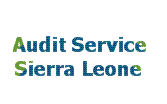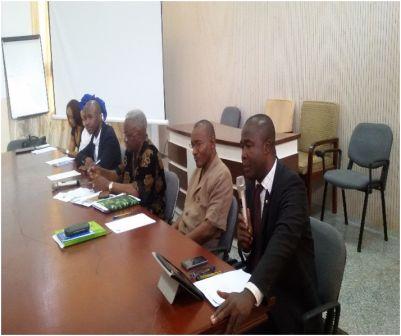Audit service made 935 recommendations in 5 yrs
Audit Service Sierra Leone (ASSL) has disclosed in its Auditor General’s report on the Account of Sierra Leone 2014 Assessments and Follow-up on Recommendations (2010-2014) that about 935 recommendations were made for selected Ministries, Departments and Agencies (MDAs).
Out of those recommendations, 231 were implemented; work is in progress for 675 recommendations while 47 recommendations were not implemented, ASSL states, noting that there are still problems in some areas of public financial management in the country.
The follow-up recommendations (2010-2014) exposed an insignificant increase in percentage of improvement from the Freetown City Council (FCC), The Office of the President, Ministry of Finance and Economic Development (MoFED), and the Ministry of Mines and Mineral Resources.
Amongst other things, the Annual Audit report states that the Freetown City Council (FCC) has implemented 13 percent of the recommendations from 4 percent of the ASSL’s previous year’s assessment, while the remaining have only made 15 percent on recommendations implemented – that is – 21.3 percent in 2012 to 36 percent in 2014.
The assessment and follow-up on s (2010-2014) identified a clear pattern of repeated observations across all the audit entities they received.
The report also observed that the areas of repetition relate to basic tenets of Public Financial Management and Compliance with the laws of Sierra Leone.
Derelictions of duty by public officers in question are largely in the areas of cash management and internal control, compliance with procurement laws and regulations, basic records management of an administrative and finance nature and protection of assets.
- One in five children still do not receive the most basic vaccines they need. This refers to DTP3 immunization coverage. While DTP3 coverage throughout Africa has improved, progress in recent years has slowed. There are also serious disparities within countries, only nine countries in Africa reported DTP3 coverage greater than 80% in all districts in 2014.
- Three critical diseases—measles, rubella, and neonatal tetanus—that have been eliminated or nearly eliminated in most regions of the world, remain widespread in Africa. In 2013, Africa was home to 45% of global deaths due to measles. Although the world has made significant progress against neonatal tetanus, a quarter of African countries are yet to eliminate tetanus cases, representing 13 of the 23 countries not having reached this achievement worldwide.
- Many countries have fragile health systems that have buckled under sudden crises, such as armed conflict or major disease outbreaks e.g. the Ebola outbreak. These systems need to be made more resilient in order to withstand future shocks. Even in times of crisis, children deserve the basic immunizations and other child survival interventions that can save their lives. Until now, progress toward increasing vaccine coverage has often been fragile, and in some countries too-easily reversed.
- Countries urged to increase investments in immunization, given the economic benefits
- While donors have played an important role in supporting immunization programs, long-term domestic commitment will play a bigger role in increasing access to routine and new immunizations. The proportion of domestic funding varies widely across African countries, ranging from 0% to 100%. Only 15 African countries fund more than 50% of their national immunization expenditures.
Currently, Gavi, the Vaccine Alliance has invested heavily in Africa, supporting 70% of countries on the continent (38/54 countries). As more African countries attain middle-income status, they will not be eligible for support from Gavi. This means that they will have to make preparations to finance immunization activities from their own national budgets.
There is growing evidence of the economic and social benefits of immunization. In addition to immunization’s potential to save lives. Research suggests that meeting the projected costs of national immunization programs is worth 16 times the original investment. At the community level, avoiding the costs associated with a vaccine-preventable disease can help keep whole families out of poverty.
The report has informed a ministerial declaration that will be open for signatures during the conference in Addis Ababa, Ethiopia. The declaration honours the progress of recent years, while also committing to universal access to immunization and strengthening of vaccine delivery systems. After the conference, the declaration will be presented to the Assembly of African Head of States and Governments at the 26th Summit of the African Union, to be held in June 2016.
Stay with Sierra Express Media, for your trusted place in news!
© 2016, https:. All rights reserved.






